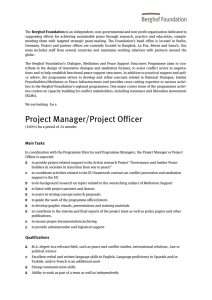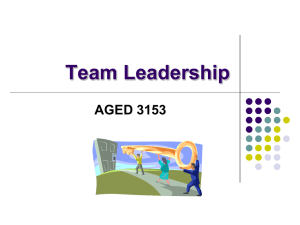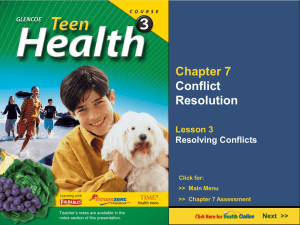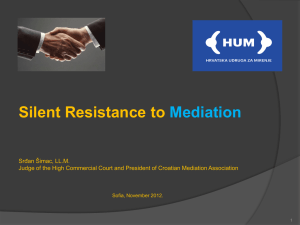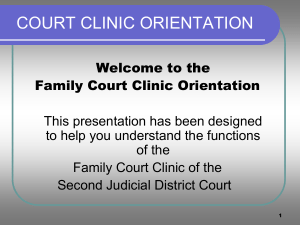Part One - Superior Court, Orange
advertisement
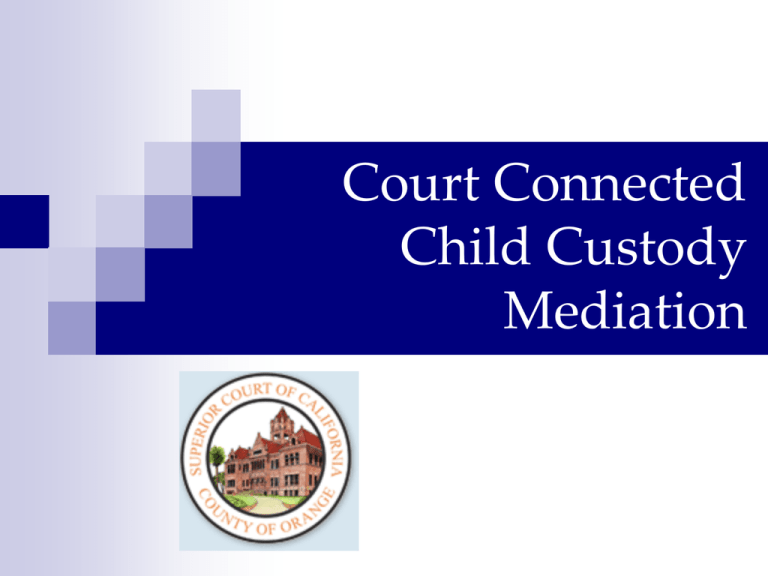
Court Connected Child Custody Mediation Introduction to Mediation Mediation is required whenever there is a dispute about child custody or visitation Mediation focuses on developing an agreement between parents that is in the best interest of the children Family Code §3170 California Law Defines Three Purposes of Mediation To reduce conflict between the parents To develop an agreement ensuring the child’s close and continuing contact with both parents To reach a settlement regarding visitation rights that is in the best interest of the child Family Code §3161 Mediation Assists Both Parents to Reach an Agreement Mediation is provided at no cost to parents Specially trained mediators will help parents work out the terms of a parenting plan Your parenting plan may consist of: How time will be shared during the school year and summer Holiday and vacation schedules Transportation and exchanges How safety issues may be addressed Other important details specific to your situation What if Parents Already Have an Agreement? To make your plan a court order, you must provide a written agreement to the court for approval. If either party has an attorney, the attorney may assist in presenting the agreement to the Court. Participation in court ordered mediation will allow a professional to review the agreement, assure all parenting plan aspects are included and prepare the agreement for filing or hearing. The Mediation Process Mediation Goals Help you reach an agreement that is in the best interest of the children Reduce conflict between the parents Enhance understanding of the other parent’s point of view Focus on what works best for your children Work out the details of your parenting plan What is NOT Discussed in Mediation? Child support Spousal support Property and other monetary disputes What may be in a Parenting Plan? Legal and physical custody Regular schedule of when the child(ren) will be with each parent School year schedule Summer schedule Holidays and birthdays Vacations Transportation and exchanges Phone calls; communication guidelines Extra-curricular activities Guidelines for addressing safety concerns Parenting Plan Considerations Age and emotional stage of development of each child Distance between parents’ residences Frequency of contact and involvement with both parents Your child’s special needs, school events, sports schedules or other extracurricular activities Safety concerns and level of parental conflict Legal Custody Legal custody includes the right to make decisions about a child’s residence, health, education, and welfare Legal custody is either joint or sole Joint legal custody = parents make decisions together Sole legal custody = one parent has the exclusive right to make decisions Family Code Sections 3003 and 3006 Physical Custody Physical custody is either joint or sole Joint Both parents share significant periods of physical custody that assures frequent and continuing contact with both parents Does not necessarily mean equal time share One parent may still be designated as the primary caregiver. Sole physical custody = physical custody = One parent provides primary residence and supervision of the child The other parent may have court ordered visitation Family Code Sections 3004 and 3007 Custody Considerations When There is Domestic Violence If the Court has made findings of domestic violence by a parent, the court will determine legal and physical custody of the children Mediation may assist with developing a safe visitation plan which may include monitored contact and third party exchanges Family Code 3044 Special Mediation Rules when there is Domestic Violence Restraining Orders are to be followed at all times A separate waiting room is available for each party The mediator will meet with the parents separately (California Rule of Court 5.215(d)(6)) A support person may be present during the mediation session (Family Code 6303) Mediation in Orange County is a Confidential Model If no agreement is reached: The matter will be referred back to court for the Judicial Officer to make a decision regarding custody and visitation The mediator will not discuss what happened during your sessions with anyone The mediator will not make a recommendation to the Judicial Officer regarding a parenting plan Mediators do not: Give legal advice Discuss child support, spousal support, or division of property Mediation Confidentiality Exceptions Mediators are required by law to report to the local child protection or law enforcement agency the following: Abuse or neglect A person’s intent to harm themselves or others Mediators may not be able to mediate if there is an open child protective services case involving the same children Who Are Your Mediators? Family Court Services mediators have a masters degree (or higher) in a behavioral science such as psychology, social work, marriage and family, or child counseling Mediators have a minimum of two years post master’s experience, knowledge of child development, the court system and community resources (Family Code 1815) In addition, court connected mediators are required to complete 8 hours of continuing education (CRC 5.210(f)(1)(B)) and 4 hours of domestic violence training annually (CRC 5.215(j)(2)) Mediation Process The participants only include the legal parents and the mediator Each parent presents their proposals for child sharing and custody The parent who filed the current request for court orders generally speaks first. If both parents filed at the same time, the mediator will ask the parents if they have a preference of who speaks first. Parents negotiate and compromise to reach an agreement The mediator Remains impartial Does not take sides Provides education and suggestions to assist parents with their parenting plan Mediation Guidelines Do Focus on child’s best interest Come with an open mind Prepare to discuss several possible options Remember children do best with involvement from both parents Don’t Focus on or blame the other parent Reject a proposal without consideration Let emotions and past history guide decisions Mediation Outcomes Agreement Reached The agreement is reviewed with both parents and forwarded to Judicial Officer for approval Partial Agreement Agreed upon terms Reviewed and forwarded to the Judicial Officer for approval Remaining issues Further mediation or Returned to court for decision When there is no agreement… Choices to assist parents may include: Further mediation Interview child Mediators may speak with parents’ attorney Refer back to court If there are safety concerns the Mediator may suggest to the Judicial Officer: Attorney Child appointed for the child Custody Investigation Psychological Evaluation (California evidence code 730) Children in Mediation Mediators will use their discretion in deciding if it is necessary to interview your children (Family Code 3180) Mediators are trained to work sensitively in these matters Children are not asked to choose sides or to choose between parents Emotional Issues Children Love Both of Their Parents Equally It isn’t their job to choose It is your job to decide Emotional Justice If you are here to right an emotional wrong, Family Court is not the place Mediation is not about winning or losing – it’s about problem solving for the best interest of your children Consider counseling and/or join a support group to help you You Stop Being Partners but... You continue as parents Separate your feelings about the other parent from your child’s needs Involvement by both parents with child’s activities is crucial to their healthy development Research Findings Children: Need to be emotionally and physically safe from parental conflict Need a relationship with both parents Who witness family violence of any kind are emotionally distressed Research Findings, cont. Children: Need consistency and regular contact with both parents, not necessarily equal time Do better when they know when they will be spending time with each parent Experience a great sense of loss during separation and/or divorce Need emotional support and guidance through the process Psychological Tasks for Children in Separation Based on Judith Wallerstein’s book Second Chances 1. 2. 3. 4. 5. Acknowledge the reality of the separation and loss Disengage from the parental conflict Resolve anger and blame Achieve realistic hope about relationships Accept the permanence of the separation Stages of Grief and Loss Through Separation Stages For Adults For Children Denial This can’t be happening. She or Mom and Dad can’t be he will come back and we will hurting me and each other. work it out. It’s only temporary. They will get back together. Anger How could she or he do this to me? I’m the responsible one. He or she is not the person I knew. How could they do this to me? If they loved me, they would stay together. Bargaining If we get counseling or I change, then we’ll get back together. If I am really good, maybe they will get back together. Stages of Grief and Loss Through Separation, cont. Stages For Adults For Children Depression I’m overwhelmed. I can’t cope. It’s It’s my fault. I hate all too much. No one understands. school. I hate my life. Nothing is okay. Acceptance It’s over. I need to get on with my life and career and help our kids get their lives back to normal. Mom and Dad are not getting back together and it’s okay. Growth I’ve moved on. I know myself better. I’m ready for something new. I don’t have to pretend anymore. Supporting Your Children Support the time the child is with their other parent Promptly share child related information Tell your children they are not the cause of the separation Remind your children both parents will always love them and take care of them Supporting Your Children, cont. Give your child permission to love both parents and their loved ones Enjoy and admire your children Give your child permission to have a positive relationship if there is a new significant other Don’t use time with the other parent as a reward or punishment for good or poor behavior How to Respond to Your Child’s Questions Acknowledge the child’s feelings Be reassuring Don’t give too much detail Provide age appropriate information Consider professional help if needed Parenting Together Understanding Co-parenting Recognize differences and respect the other parent’s parenting style Children do adjust and adapt to two separate homes with separate rules & expectations The 3 “C’s” of Co-Parenting: Communication Collaboration Coordination Communication is the Key to Successful Co-parenting Maintain focus on children Share information regarding child’s activities Avoid conflict while children are in earshot Timeouts when conversation is tense Listen Co-parenting Tips Be respectful of each parents’ role in your child’s emotional development Respect each other’s point of view Maintain flexibility for child’s needs, Vacations, Special Events, Illness Be consistent in the routine between both homes as much as possible Bedtime, Nutrition, Hygiene, Homework, TV & Computer, Discipline Problems You Can Avoid Using your child as a pawn, messenger, spy, or bargaining chip Criticizing the other parent in front of the child Making your child take sides Withholding your love when you are angry with the other parent More Problems to Avoid Withholding visits Arguing in front of your child Speaking negatively about the other parent or their loved ones Focusing on the small stuff, remember the bigger picture Excluding the children from their extended family members, including half- and step-siblings and grandparents Important Reminders It is a difficult time for both children and parents Your behavior will impact your child’s ability to experience healthy future relationships Children will need your support Children experience conflicting feelings, often expressed differently to each parent Parenting continues beyond your child’s 18th birthday More Reminders Children do best when parents get along Put aside your differences for your children’s sake Come to mediation with an open mind Your Children = Your Decision Parents who make their own mutual decisions regarding their Parenting Plan are less likely to need future court involvement and are generally happier with the outcome Frequently Asked Questions How do I get my mediation appointment? • • Appointments are initially set by the Family Law clerk at the time one parent files a Request for Order (RFO) for custody or for a modification of an existing court order. An Order with the date and time of your mediation appointment will be included in the RFO. Parents may also be referred to mediation by the Judicial officer When are appointments? Scheduled Monday-Friday, between the hours of 8:00 am and 3:00 pm. Plan to be at your appointment for at least two hours. What if someone does not attend mediation? Notice of a failure to appear will be provided to the Judicial officer for the hearing. A monetary sanction of $100.00 may also be imposed. Failure to attend your mediation appointment may cause your court hearing to be rescheduled, delaying the opportunity for the judicial officer to make any decisions regarding custody and time with your children. What if someone is late? Mediation cannot start until both parties arrive. A late arrival of 30 minutes may result in the appointment being cancelled and notice provided to the Judicial officer. Frequently Asked Questions, cont. How much does it cost? There is NO cost for mediation. Can I reschedule? Only in an emergency. Call 657-622-6196 to reschedule your appointment at least 72 hours in advance. Who should attend? Both parents attend together. Do not bring children or significant others. Where is mediation held? On the 5th floor in the Lamoreaux Justice Center, Family Court Services Office, Room 507 341 The City Dr. Orange, CA 92863



